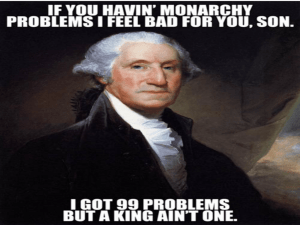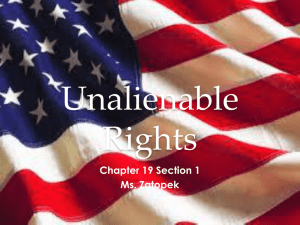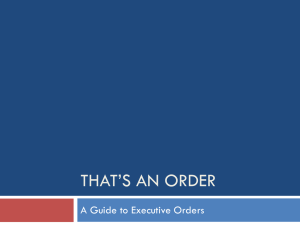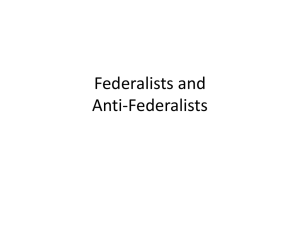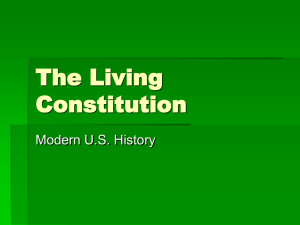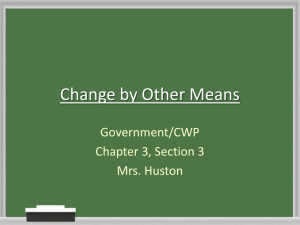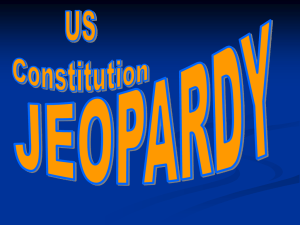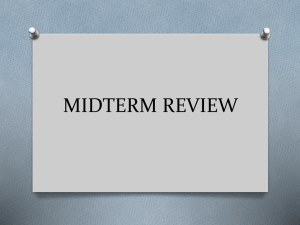United States History 1783-1848
advertisement
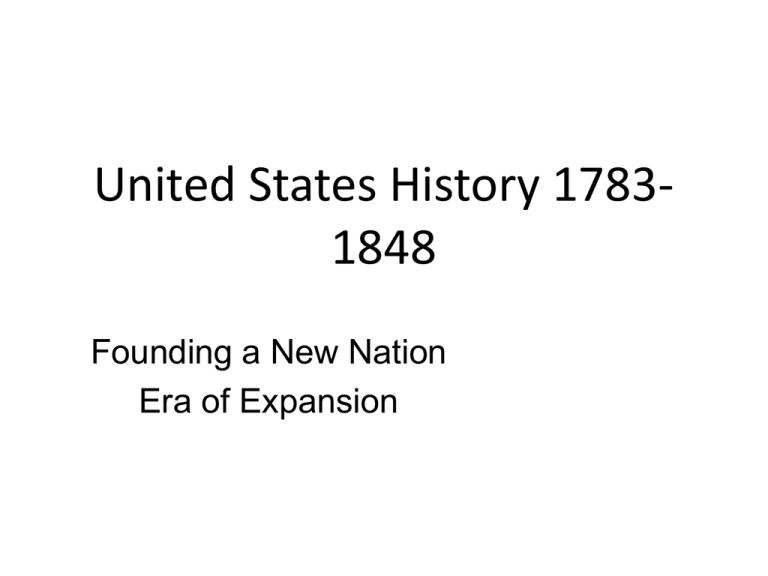
United States History 17831848 Founding a New Nation Era of Expansion The New Nation • American Gov’t during Revolution: – Loose union of 13 states (nations) – Weak central government – No power to tax Participation Points Get into groups and discuss the following questions. 1. What are the Articles of Confederation? 2. What are their weaknesses? Articles of Confederation • The first Constitution • The 2nd Continental Congress met to write it in 1777, a year after they wrote the Declaration of Independence. • It’s goal was to provide some organization, but to make sure the states would keep their independence. • In 1788, a new Constitution was approved to replace it. Problems during “Articles of Confederation” Period • • • • • Unpaid Revolutionary War debts No central money system Pirate attacks on American shipping Indian attacks on frontier Daniel Shays’s Rebellion, 1786 Constitutional Convention 1787 • 1st decision: get rid of Articles • James Madison, “father of the Constitution” • Madison’s plans: – Strong central government with 3 branches: executive, legislative, judicial – System of checks & balances – System of federalism with each state guaranteed republican form of government – New states admitted to union as equals Washington Presiding at Constitutional Convention The Great • Greatest challenge: representation Compromise – Large state plan: based on population – Small state plan: equal representation • Connecticut (Great) Compromise: – Representatives based on population – Equal number of Senators (2) per state Slavery • Northern states wanted all slaves taxed • Southern states did not • Southern states wanted all slaves counted for purposes of representation • Northern states did not • Result: 3/5 Compromise (each slave counted as 3/5 of a person for both taxes and representation) Slavery • States were required to return runaway slaves to their masters Ratifying (approving) the Constitution • Federalists: supported Constitution • Anti-federalists: feared loss of state power & individual rights • Promise of Bill of Rights (first 10 Amendments to Constitution) wins over many Anti-federalists • Constitution takes effect 1789 Bill of Rights • 1st Amendment: The “five freedoms” – Freedom of religion – Freedom of speech – Freedom of the press – Freedom to peacefully assemble – Freedom to petition the government to deal with complaints Bill of Rights • 2nd Amendment: The right to keep and bear arms • 3rd Amendment: Soldiers cannot be housed in a person’s home without that person’s permission Bill of Rights • 4th Amendment: Government cannot search people’s homes without a warrant • 5th Amendment: – Guarantees people a trial. – Ensures that people do not have to be a witness against themselves. – The government cannot take private property without paying a fair price for the property. Bill of Rights • 6th Amendment: The right to a speedy trial with an attorney • 7th Amendment: Right to trial by jury • 8th Amendment: Protection from cruel and unusual punishments Bill of Rights • 9th Amendment: Just because a right is not mentioned in the Constitution does not mean that people are not entitled to it. • 10th Amendment: Powers not held by the Federal Government are the people’s Rights and Liberties Get into groups of 6 • Pick a leader for you group. • Send them up to get a Bill of Rights handout • Talk with your group and decide if the following statements are constitutionally correct. • If the statement is constitutionally correct, write correct. • If it is not constitutionally correct, write the amendment that it contradicts. Is it constitutionally Correct? 1. The government does not like a man's ideas, so it does not allow him to make a speech in public. 2. A town does not like the religious beliefs of a certain group, so it forbids it from building a house of worship. 3. A man accused of a serious crime refuses to give evidence against himself. 4. The government orders a newspaper to stop printing editorials that criticize the government too much. 5. A group of people are arrested because they wrote to Congress saying that they did not like a certain law. Constitution • • • • Written 1787 Ratified 1788 In effect 1789 Big reason for ratification was widespread trust in George Washington & belief he would be first President • http://www.schooltube.com/video/c658860 b99907f7ac667/The%20Preamble President George Washington • • • • Elected unanimously Served 1789-1797 Declined kingship Declined royal titles; simply “Mr. President” Page 20 Washington and his Cabinet • Secretary of State Thomas Jefferson • Secretary of Treasury Alexander Hamilton • (also Secretary of War John Knox & Attorney General Edmund Randolph) Page 21 The different documents through history… • Mayflower Compact: early constitution written by the Pilgrims, 1620. • Declaration of Independence: announcement of intention to become a free nation, 1776. • Articles of Confederation: first attempt at a constitution, 1777. • Constitution: official description of American Government and Law, 1787. • Bill of Rights: first 10 amendments (changes) to Constitution. Describes the people’s rights. 1789. Alexander Hamilton • Economist in charge of the US Treasury, under George Washington. • He thought the central gov’t should have more power and should collect taxes. • Many people (including Thomas Jefferson) disagreed with him. • He helped create the first US National Bank and tax system. • Now his face is on our $10 bill. Whiskey Rebellion • First challenge to new government • Whiskey tax was resisted in the west • Washington leads troops, then turns over command to Hamilton • Rebellion ends quickly • Demonstrates power of new government First Party System • Formed around ideas of Jefferson & Hamilton Page 25 Thomas Jefferson • DemocraticRepublican Party • Limited government • Strict construction (narrow interpretation of Constitution) • Favored farmers • Opposed national bank Page 26 Alexander Hamilton • Federalist Party • Strong central government • Loose construction (broad interpretation of Constitution) • Favored manufacturers • Promoted national bank Page 27 Paying state debts from Revolutionary War • Southern states paid most of their debts • Northern states owed much money • Hamilton wanted Federal government to pay all states’ debts • Southern states opposed Compromise • South agreed to pay off all state debts (benefited mostly North) • North agreed to locate national capital in South • Washington, D.C., chosen as new capital (Virginia-Maryland border) Neutrality • • • • France & England were at war in the 1790s Washington was urged to aid France Washington refused to take sides He advised a policy of neutrality in foreign affairs • “No entangling alliances” with European powers Washington steps down • Americans urge Washington to run for 3rd term • Washington retires after 8 years – sets precedent (only Franklin Roosevelt violates precedent) • Washington possibly greatest President – remained uncorrupted by power Thomas Jefferson, 1801-1809 • 1800 election: first peaceful change of power from one party to another • Promoted equality & democracy • 1803 Louisiana Purchase: doubled size of United States Page 32 Louisiana Purchase War of 1812: Causes War between Britain and America. • Indian troubles & British weapons sales. • Britain was at war with France (Napoleon) so they tried to restrict US trade with France. (Neutrality – US had the right to trade.) • British wanted to search American ships for British deserters. • Desire for expansion. War of 1812: American Failure • President Madison declared war on Britain • Failed invasion of Canada. • Washington D.C. burned, 1814. Ft. McHenry, Francis Scott Key, & The Star Spangled Banner The Star Spangled Banner (first verse) O! say can you see by the dawn's early light, What so proudly we hailed at the twilight's last gleaming, Whose broad stripes and bright stars through the perilous fight, Over the ramparts we watched, were so gallantly streaming? And the rockets' red glare, the bombs bursting in air, Gave proof through the night that our flag was still there; O! say does that star-spangled banner yet wave, Over the land of the free and the home of the brave? The Star Spangled Banner • http://v.youku.com/ v_show/id_XMTM0N Dc3NjE2.html • We often sing the national anthem at sports games. • People are supposed to stand up and take off their hats. End of War of 1812 • Compromise peace treaty, December, 1814 • Britain and America were at peace after this and later became allies. • America didn’t try to invade Canada again. U.S. in 1819 Monroe Doctrine 1823 • • • • President James Monroe, 1817-1825 Basis of American foreign policy “America for Americans” European interference with Latin American nations would not be tolerated • New World closed to further colonization • US would stay out of European wars Jacksonian Democracy • • • • President Andrew Jackson, 1829-1837 Popular war hero Champion(hero) of the common man All white men could vote (not just property owners) • 1828 election a “Second American Revolution” (democracy) • “Spoils system”: officials chosen for loyalty to the party rather than ability • Idea of “Manifest Destiny” – expansion to the Pacific. Texas Revolt, 1836 • • • • US settlers in northern Mexico (Texas) Revolted against Mexico Battle of Alamo: buys time General Sam Houston: defeats Mexicans at San Jacinto • Republic of Texas an independent nation Mexican War, 1846-48 • Spirit of “Manifest Destiny” – American expansion divinely ordained • 1845 Texas joins the United States • Shots fired in disputed territory • Great American victories • 1848 treaty: US gets 1/3 of Mexico, including Arizona, New Mexico, & California Mexican War New Inventions • 1793 cotton gin: agricultural revolution in South – makes slavery more profitable • Steamboats: help unify America & make it easier to sell crops • Railroads: connect towns which have no river transportation Robert Fulton’s Claremont: First successful steamboat Westward Expansion • California Gold Rush: “49-ers” • Chinese in California • Divisive political issue: expansion of slavery into territory taken from Mexico U.S. in 1850 Required Reading • Sections 5 and 6

